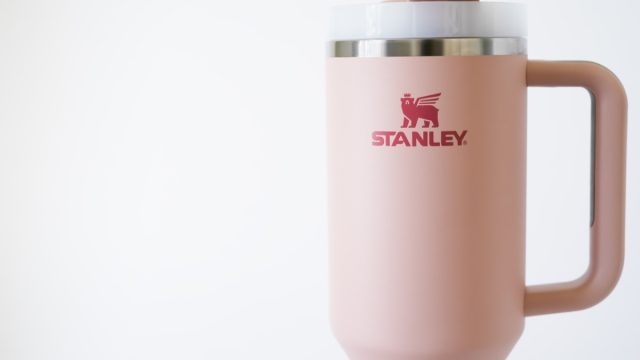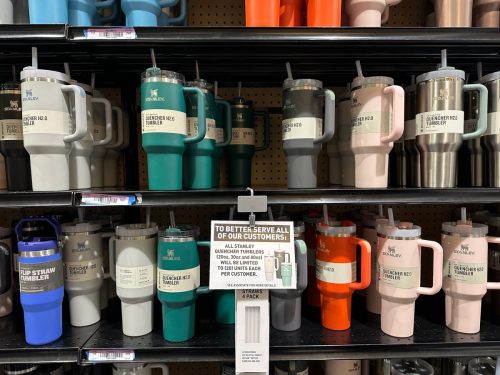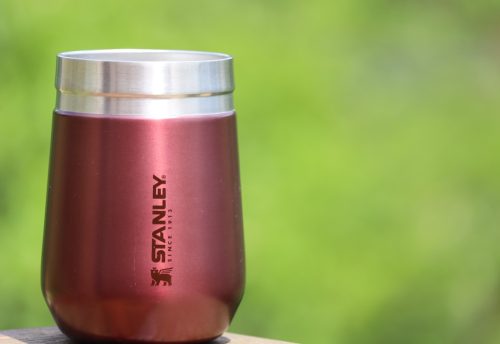Stanley Tumbler Customers Claim Their Cups Are Testing Positive for Lead

If the Stanley tumbler isn’t the hottest product available right now, it’s certainly up there. This highly-coveted cup has become the “It” reusable water bottle across social media, taking the viral spotlight away from prior favorites like Yetis and Hydro Flasks. But while the craze over these insulated cups has led to shoppers getting trampled amid special limited releases, those same customers are now sharing safety concerns. Many have taken to social media with claims that Stanley cups are testing positive for lead. Read on to discover where these claims started, and what the company has to say about the viral allegations.
RELATED: Is Your Stanley Tumbler a Hotbed for Germs? Experts Reveal How to Clean It Right.
A lead poisoning activist first brought attention to Stanley tumblers last year.

In March 2023, Tamara Rubin, a federal award-winning lead poisoning prevention advocate who founded Lead Safe Mama, LLC, released a post about XRF lead testing done on a Stanley 40-ounce FlowState Quencher H2.0 Tumbler. According to the results gathered by Rubin’s company, the insulated stainless steel cups tested positive for “unsafe/hazardous levels of lead.”
“We published two videos confirming that there is—in fact—lead under the bottom metal disc (with the logo, in the center of the bottom of the cup) used as the sealing material to create the insulated seal for this cup,” Rubin wrote in the post.
RELATED: Fruit Pouch Recall Expands After Illnesses Linked to Lead.
Now customers are allegedly confirming that cups test positive for lead.
Everyday Stanley tumbler customers have begun bringing similar concerns to social media. In a now-deleted video, TikTok user @Fo.od_forThought posted a clip showing her performing a lead test on her Stanley cup, The U.S. Sun reported.
“Good news, I got the lead test,” she said. “Bad news, if there’s color on these, they have lead in them.”
The TikToker proceeded to show that several of the test swabs had turned darker after being swabbed on the tumblers. “See that? Throw away your Stanleys or at least put them in a box in hopes they recall,” she said.
Another TikTok video from Abbie Joy Daniels (which has been viewed over 226,000 times in just two days) showed Daniels performing lead testing on her own Stanley cups.
“I want to see if these Stanleys have lead in them for myself so I bought a lead kit … There is lead in the bottom,” she said after swabbing underneath a tumbler where the bottom had fallen off.
RELATED: 7 Best Stanley Tumbler Dupes, Retail Experts Say.
Lead exposure can cause serious health problems.

While it is not illegal for manufacturers to use it in their products, the U.S. Food and Drug Administration (FDA) does monitor and regulate levels of lead in food and foodware because “there is no known safe level of exposure to lead.”
Lead is toxic to humans of any age, according to the agency.
“The potential for adverse health effects from consuming food contaminated with lead vary depending on the level of lead in the food; age of the consumer; length, amount, and frequency of exposure to lead in the food; and other exposures to different sources of lead and to beneficial nutrients,” the FDA explains on it website.
Exposure is most dangerous for children, as high levels of lead can cause neurological effects, such as learning disabilities, behavior difficulties, and lowered IQ at a young age.
“For adults, chronic lead exposure is associated with kidney dysfunction, hypertension, and neurocognitive effects,” the agency adds.
Stanley maintains that the use of lead in its products is safe.

Best Life reached out to Stanley about the concerns for customers, and we will update this story with their response. But in statement to Charlotte NBC-affiliate WCNC, the company confirmed that its cups are manufactured with a part that includes lead.
“We seal our vacuum insulated stainless steel products with an industry-standard pellet that includes some lead,” Stanley said.
However, the company maintained there is “no lead present on the surface of any Stanley product” that would come into contact with the user or the liquid inside.
“The pellet is completely enclosed by a stainless-steel cover, making it inaccessible to consumers,” Stanley told WCNC, noting that its cups meet all U.S. regulatory requirements.
In the “rare” case that a customer’s base cap comes off during “ordinary use” and exposes the lead-containing pellet, Stanley indicates on its website that the product is eligible for a replacement through its Lifetime Warranty.
RELATED: For more up-to-date information, sign up for our daily newsletter.
- Source: FDA: Lead in Food and Foodwares